Nov 2, 2022
받침없는 한국어 문장 읽기: Without final consonants(2)
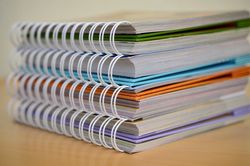
학습목표 Learning outcomes
① 받침없는 문장을 읽을 수 있다.
② 발음교정을 통해서 한국어 실력을 향상시킬 수 있다.
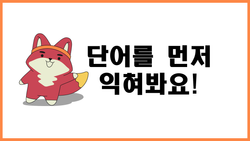
단어 익히기Vocab)
1. 우유 [uyu] n. milk
2. 요요 [yoyo] n. yo-yo
3. 아우 [au] n. brother
4. 주사 [jusa] n. injection
5. 아버지 [abeoji] n. father
6. 부부 [bubu] n. (married) couple
7. 수저 [sujeo] n. spoon
8. 바지 [baji] n. pants
9. 자리 [jari] n. seat
10. 비 [bi] n. rain
11. 기차 [gicha] n. train
12. 재채기 [jaechaegi] n. sneeze
13. 채소 [chaeso] n. vegetable
14. 키 [ki] n. height
15. 코 [ko] n. nose
16. 쿠키 [kuki] n. cookie
17. 캐나다 [kaenada] n. Canada
18. 파리 [pari] n. fly
19. 요구르트 [yogureutu] n. yogurt
20. 우표 [upyo] n. stamp
21. 후추 [huchu] n. black pepper
22. 호수 [hosu] n. lake
23. 하마 [hama] n. hippo
24. 해바라기 [haebaragi] n. sunflower
25. 해 [hae] n. sun
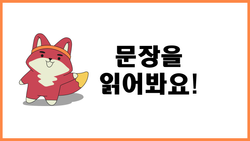
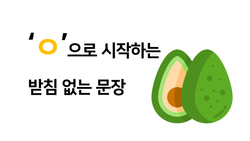
받침없는 문장 읽기 Let's read sentence without final consonants
1. 아이야, 우유
[aiya, uyu]
[Hey girl, it's a milk.]
2. 아이야, 요요
[aiya, yoyo]
[Hey boy, it's yo-yo]
3. 아우야, 오이
[auya, oi]
[Hey brother, it's cucumber]
4. 여우야, 요요
[yeouya, yoyo]
[Hey fox, it's yo-yo]
5. 아야야, 아야야
[ayaya, ayaya]
[Ouch, Ouch]
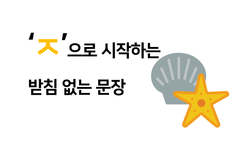
받침없는 문장 읽기 Let's read sentence without final consonants
1. 주사가 아야!
[jusaga aya!]
[An injection is aching!]
2. 아버지, 아버지, 우리 아버지
[abeoji, abeoji, uri abeoji]
[Father, father, my father]
3. 아버지, 어머니, 부부
[abeoji, eomeoni, bubu]
[Father, mother, couple]
4. 네 수저가 저기에, 내 바지가 여기에
[ne sujeoga jeogie, nae bajiga yeogie]
[Your spoon and chopsticks are over there, pants are here]
5. 내 자리가 여기, 네 자리가 저기.
[nae jariga yeogi, ne jariga jeogi.]
[My seat is here, your seat is there.]
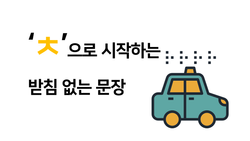
받침없는 문장 읽기 Let's read sentence without final consonants
1. 비가 그치다.
[biga geuchida.]
[The rain stops.]
2. 기차가 저기 가요. 추추!
[gichaga jeogi gayo. chuchu!]
[The train is going over there. Chuchu]
3. 재채기 아추!
[jaechaegi achu!]
[Sneeze. Achu!]
4. 다리 다쳐서 여기 서서 기다려
[dari dachyeoseo yeogi seoseo gidaryeo]
[I hurt my leg, so stand here and wait.]
5. 야채가 바로 채소야
[yachaega baro chaesoya]
[Yachae is vegetable's similar another name.]
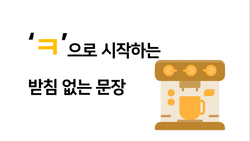
받침없는 문장 읽기 Let's read sentence without final consonants
1. 키가 크다.
[kiga keuda.]
[He is tall.]
2. 코가 크다.
[koga keuda.]
[He has a big nose.]
3. 쿠키가 부서져서 여기 저기에.
[kukiga buseojyeoseo yeogi jeogie.]
[The cookies broke here and there.]
4. 이모 보러 캐나다에 가.
[imo boreo kaenadae ga.]
[I'm going to Canada to see my aunt.]
5. 카드에 카메라 그려 보거라.
[kadeue kamera geuryeo bogeora.]
[Draw a camera on the card.]
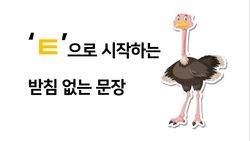
받침없는 문장 읽기 Let's read sentence without final consonants
1. 타조 타고 가요.
[tajo tago gayo.]
[I ride an ostrich.]
2. 기타 치며 노래 부르기.
[gita chimyeo norae bureugi.]
[Singing while playing the guitar.]
3. 요구르트 마시기.
[yogureuteu masigi.]
[Drinking yogurt.]
4. 슈퍼스타 우리 어머니.
[syupeoseuta uri eomeoni.]
[Super star, my mother.]
5. 바지가 터져서 어머니가 고치셔.
[bajiga teojyeoseo eomeoniga gochisyeo.]
[My pants brust, so my mom fixes it.]
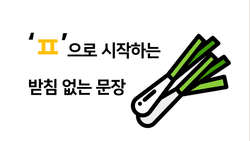
받침없는 문장 읽기 Let's read sentence without final consonants
1. 피가 나고 아파요.
[piga nago apayo.]
[I'm bleeding and it hurts.]
2. 코피가 나서 무서워요.
[kopiga naseo museowoyo.]
[I'm scared because my nose is bleeding.]
3. 주소 쓰고 우표 부쳐서 이모에게
[juso sseugo upyo buchyeoseo imoege]
[I wrote the address and sent a stamp to my aunt]
4. 파리야, 파리야, 저리 가거라.
[pariya, pariya, jeori gageora.]
[Fly, fly, go away.]
5. 이가 아파서 치과에 가요.
[iga apaseo chigwae gayo.]
[I go to the dentist because my teeth hurt.]
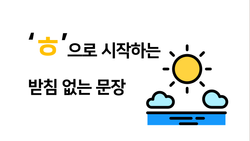
받침없는 문장 읽기 Let's read sentence without final consonants
1. 하마야, 호수가 보여.
[hamaya, hosuga boyeo.]
[Hippo, I can see the lake.]
2. 후추가 매워요.
[huchuga maewoyo.]
[Pepper is spicy.]
3. 다리하고 허리가 아파요.
[darihago heoriga apayo.]
[My leg and back hurt.]
4. 크리스마스에 호호호
[keuriseumaseue hohoho]
[On Christmas, hohoho]
5. 해바라기가 해 따라다니네.
[haebaragiga hae ttaradanine.]
[Sunflower are following the sun.]
복습 Review!
1. 네 수저가 저기에, 내 바지가 여기에
2. 쿠키가 부서져서 여기 저기에.
3. 후추가 매워요.
By undefined
20 notes ・ 340 views
Korean
Beginner